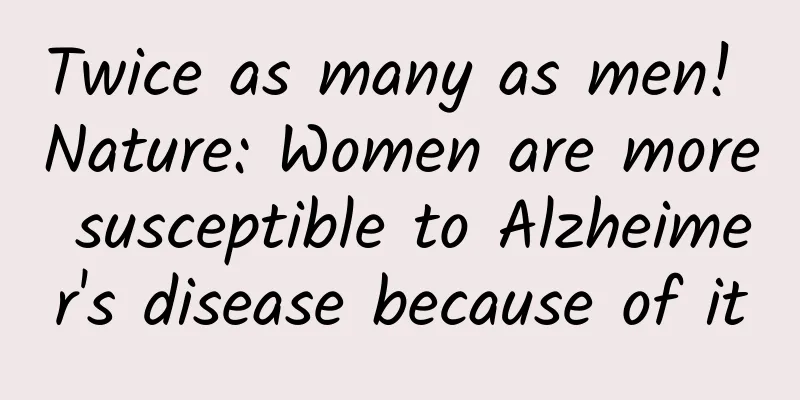Twice as many as men! Nature: Women are more susceptible to Alzheimer's disease because of it

|
Author: Diao Wenhui You can’t remember what you just said, you can’t recall what you just did, you can’t recognize the people around you... Alzheimer’s disease is one of the most difficult diseases to cure in the world and is known as the "eraser in the brain." Currently, there are at least 50 million Alzheimer's patients worldwide. Epidemiological surveys show that the number of female Alzheimer's patients is twice that of male patients, but the reason for this phenomenon has been unclear. On March 3, the team led by Professor Ye Keqiang of the School of Life Sciences and Health of Shenzhen University of Science and Technology (tentative name, hereinafter referred to as Shenzhen University of Science and Technology) of the Chinese Academy of Sciences published the latest research results in Nature, explaining this mystery that has troubled mankind for many years. The research team revealed for the first time that increased follicle-stimulating hormone (FSH) is an important reason why women are more likely to suffer from Alzheimer's disease than men. "This important discovery not only provides a new cause and mechanism for why women are more susceptible to Alzheimer's disease, but also provides a new molecular target for early clinical screening and intervention of Alzheimer's disease," commented Wang Jianzhi, professor of the Department of Pathophysiology at Tongji Medical College, Huazhong University of Science and Technology. Postmenopausal women are more susceptible to disease Why are women more susceptible to Alzheimer's disease? Scientists have given various possible explanations for this issue. Some people believe that lack of sleep and long-term stress may be the reasons for the high incidence of Alzheimer's disease in women; some people suggest that women carrying specific risk genes such as ApoE 4 have a higher risk of developing Alzheimer's disease; others believe that this is related to the decrease in hormones in women after menopause. However, there is no substantial evidence to prove the above speculations. Ye Keqiang's team has been committed to the research on the pathogenesis, early diagnosis and drug development of neurodegenerative diseases. Based on the systematic summary of the team's hundreds of academic papers, the team proposed the research theory that "there is a 'C/EBPβ/AEP neural signaling pathway' in the brain, and the activation of this pathway is the core driving factor leading to neurodegenerative diseases." Based on this conclusion, the research team studied hormone substances whose concentrations in women before and after menopause changed dramatically. They found that among more than ten core hormones that underwent significant changes, follicle-stimulating hormone was an important pathogenic factor that made women more susceptible to Alzheimer's disease. Studies have shown that after menopause, the level of follicle-stimulating hormone in women's bodies increases sharply by 10 to dozens of times, while the level of follicle-stimulating hormone in men of the same age only increases by 2 to 3 times. The sharply increased follicle-stimulating hormone binds to the receptors on the surface of neurons in the brain, activating the C/EBPβ/AEP pathway in the brain, thereby inducing Alzheimer's disease. For women, follicle-stimulating hormone plays a role in promoting the development and maturation of follicles and is involved in the formation of normal menstruation. Its production is also reversely regulated by ovarian estrogen. "During women's menstruation, estrogen levels rise and are regulated by the brain to inhibit the increase in follicle-stimulating hormone, and this cycle repeats itself. As women age, ovarian function declines, and after menopause, estrogen levels decrease and follicle-stimulating hormone is no longer inhibited, making women more susceptible to Alzheimer's disease," said Xiong Jing, co-first author of the paper. Exploring the pathogenic mechanism How does follicle-stimulating hormone affect the C/EBPβ/AEP signaling pathway and lead to Alzheimer's disease? The research team conducted experiments from four different angles and methods. The team first injected follicle-stimulating hormone into the Alzheimer's disease mouse model and found that both male and female mice accelerated the changes in Alzheimer's disease pathology. They inhibited the C/EBPβ/AEP pathway in the Alzheimer's disease mouse model and reduced the pathological changes in ovariectomized mice. Next, they knocked out the receptors in the neurons of the Alzheimer's disease mouse model, preventing follicle-stimulating hormone from binding to the receptors and activating the C/EBPβ/AEP pathway. This alleviated the pathological symptoms of Alzheimer's disease mice after ovarian removal and enhanced memory recovery. Furthermore, they injected specific antibodies for follicle-stimulating hormone into the abdominal cavity of mice with Alzheimer's disease whose ovaries had been removed and found that after blocking the function of follicle-stimulating hormone, the C/EBPβ/AEP pathway could not be effectively activated, which reduced the pathological behavior of the mice and restored their cognitive level to a certain extent. Focusing on the key factor of follicle-stimulating hormone, the research team fully confirmed that follicle-stimulating hormone causes changes in Alzheimer's disease-related pathology through the C/EBPβ/AEP pathway from multiple aspects, including receptor gene knockout, specific blocking of follicle-stimulating hormone, exogenous supplementation, and inhibition of signal pathways, further revealing the specific mechanism by which the incidence of Alzheimer's disease in women is higher than that in men. New strategy to reduce disease risk At present, traditional methods of clinical intervention for Alzheimer's disease include drug intervention, gene intervention, rehabilitation training, etc. However, these can only improve symptoms but cannot prevent the progression of the disease. So how can women reduce the risk of Alzheimer's disease? In this regard, the paper's corresponding author Ye Keqiang said that a balanced diet, an optimistic attitude, proper exercise, and adequate sleep can help reduce inflammation in the body and appropriately delay the onset of menopause, which can reduce the risk of the disease to a certain extent. It is understood that the research team will conduct in-depth research on the relationship between specific risk genes such as ApoE4 and follicle-stimulating hormone at the mechanism level to explain why female ApoE4 carriers are more susceptible to the disease. In addition, the team is conducting preclinical research on specific antibodies against follicle-stimulating hormone in order to bring new treatment strategies for Alzheimer's disease. "A large number of our previous studies have shown that the C/EBPβ/AEP signaling pathway is the core factor and main contradiction of age-dependent diseases. Based on this hypothesis, we hope to reveal how various risk factors mediate the occurrence of neurodegenerative diseases by activating this pathway." Ye Keqiang said that the team is currently conducting verification in the new laboratory of Shenzhen University of Technology around various age-dependent chronic diseases such as diabetes, atherosclerosis, cancer and aging. Wang Yanjiang, professor of neurology at Daping Hospital of the Army Medical University, said that this study not only revealed a key cause of Alzheimer's disease in postmenopausal women, but also suggested that follicle-stimulating hormone is a common intervention target for common elderly diseases such as Alzheimer's disease, obesity, osteoporosis and hypercholesterolemia. Using antibodies and other methods to lower follicle-stimulating hormone levels may be a new way to prevent and treat the above-mentioned geriatric diseases and improve the overall health of the elderly, which is worth exploring. Related paper information: https://doi.org/10.1038/s41586-022-04463-0 China Science Daily (2022-03-03 Page 1 News original title: "Women are more susceptible to Alzheimer's disease, and the reason is this") Editor | Zhao Lu Typesetting | Zhihai The picture is from the copyright library, and the picture content is not authorized to be reproduced |
Recommend
How can you do Android development if you don’t even understand Context?
Activity mActivity =new Activity() As an Android ...
How much does it cost to renovate a second-hand house in Lanzhou? How much does it cost to renovate an old house?
Why do so many owners of second-hand houses just ...
Want to achieve the "complete form" of intelligent driving? Cars, roads, and clouds must first "align granularity"
With the mature development of new energy intelli...
Why do all the unearthed Terracotta Warriors have single eyelids? It may be due to these two reasons →
A reporter recently learned from the Qin Shihuang...
Is Suning crazy to spend 150,000 yuan on a refrigerator just to hear the noise during its 618 event?
The future world must be intelligent and convenie...
Can you "recharge" yourself by getting more sun? Uncover the secret of energy in the sun
Audit expert: Chen Mingxin National Level 2 Psych...
The Force Awakens: Sunflower Remote Control IOS5.0 New Touch Button Tribute to Star Wars
[[161803]] After a lapse of ten years, Star Wars:...
The life-and-death feud between Steve Jobs and these six people
A new biography of Steve Jobs, released Tuesday, ...
Dragon Head Cousin Dragon Head Tactics Teaching
Introduction to the teaching resources of Dragon ...
Don't let your iPhone trust your computer at will. This is a dangerous operation.
Although few people connect their phones to compu...
What health gifts will nutritionists give during the Spring Festival?
Author: Wu Jia (registered dietitian) Editor: Fan...
From 0 to 20 million, the 3-year growth path of Get APP
1. Get the PMF of the app PMF, or product-market ...
5 styles of playing Douyin live broadcast!
It is becoming increasingly difficult to live str...
Yan Su's personal profile: The number of website contents collected does not directly affect the keyword ranking
Is there a direct correlation between a site'...
How does Zhurong cope with the winter on Mars? The engineering team explains
According to the Lunar Exploration and Space Engi...









